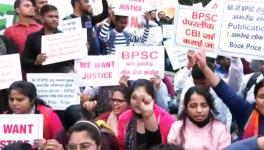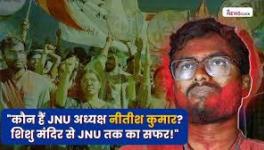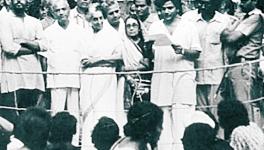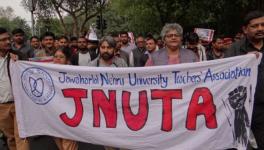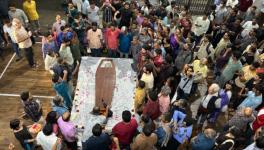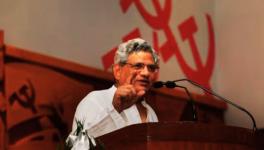No Choice But Multiple Choice? The Questionable Decision of JNU Administration
Let us begin with a fictional story.
Imagine, there is a multi-specialty hospital with various departments, each manned by qualified doctors with their respective specialisations. The hospital board then appoints a new Director, who is himself a qualified surgeon. This Director then issues a circular stating that in order to raise the standards of medical care and to speed up treatment in every department of the hospital, surgery will now be the compulsory mode of treatment for all ailments and patients. Further, the circular states that any medication, counselling or physiotherapy will only be prescribed to prepare the patient for surgery and as part of post-operative care.
In response to the initial murmurs of protest, additional instructions are issued stating that since every doctor has at least a basic MBBS degree, no one can contest their ability to perform surgery — and any refusal to use this procedure will invite strict disciplinary action.
All objections, based on sound medical procedure, stating that surgery should not be prescribed for every case are overruled. In fact, even before there could be any discussion about it, a tender notice is issued inviting bids from contractors to build operation theaters in every department.
As justification for this decision, the Director cites his own experience of having conducted a number of successful surgeries and the wonderful technologies that have now become available for them. He asserts that his experience and knowledge, along with his position as Director, makes him a “Competent Authority” to issue the said circular. He also says there is no legislation or authority dealing with medical care that explicitly debars him from issuing such a circular. Instead, he is vested with greater responsibility than anyone else in the hospital to ensure that medical care of the highest standards is offered and, accordingly, he enjoys special discretionary powers.
This fictional story would horrify most people if it was indeed real — and it wouldn’t require a trained doctor to understand why doctors in the hospital would be agitated by the circular.
Well, the same story is currently playing itself out, not in the context of a hospital but in that of a University.
The central issue at stake is the same — it is about who should exercise the right to take decisions that require specialised knowledge and experience.
Read more: JNU Gives Go-ahead to Online Entrance Exam Despite Protests
The University being referred to is Jawaharlal Nehru University (JNU). And the counterpart of the Director’s directive in the hospital story is the decision of the JNU Administration led by the Vice-Chancellor to shift what is the written part of the University’s entrance examinations to an entirely computer-based (online) process.
Just like in the multi-specialty hospital described above, JNU has several Departments (called Centres) that offer programmes across a wide range of disciplines covering the spectrum — social sciences, humanities, natural sciences and mathematics. Not only do we see a great diversity of disciplines, the programmes to which admissions are made through the entrance examinations are primarily specialised post-graduate and research programmes.
The JNU Administration’s decision to switch over to online entrance examinations is not merely about how and where the candidates take these examinations.
For a large number of students, there will be complications involved in moving from pen and paper (an exam typically taken inside a classroom in some Kendriya Vidyalaya in the country) to a computer located at some computer centre.
It is, however, the corollary of the switch to online examinations on which I wish to focus here.
This is the decision that in all disciplines and for all programmes the examination mode will have to exclusively follow a multiple-choice questions (MCQ) format. It is this unilateral imposition of a system where the candidate simply opts for the unique ‘correct’ answer to every question from among the given alternatives that many in JNU have opposed.
The MCQ method of testing doesn’t necessarily need a computer-based examination and in fact is also amenable to be combined with machine checking without being computer-based (JNU has been using OMR sheets in cases where the examination or a part of it is MCQ based).
However, restricting it to the MCQ mode for all programmes is the only practical option if it is decided that these examinations have to be computer-based.
That being the case, the fundamental question that arises is — should a decision to shift to an online examination be taken without considering the academic implications of restricting all testing to the MCQ mode?
This is exactly like asking whether the decision to prescribe surgery as the exclusive mode of treatment should have been taken in our story above without considering all of its implications for the treatment of patients.
In our fictional story, who would be the person considered most capable of answering the question of how useful and effective surgery is for treatment?
The answer is obvious — the doctors in different departments; and each would have varying answers about the effectiveness of surgery as a treatment for the ailments they deal with.
The psychiatry department may say that surgery is of no use in the treatment of psychiatric problems. The cardiology department may say that in some cases surgery is absolutely necessary while at other times medication is the best course, and in yet others prescribing diet control and exercise may be sufficient. The surgery department might say that this is all they do but only for cases referred to them and after having ascertained that it is a feasible option. The neurosurgeons might say that they often actually advise against surgery because the risks of further brain damage outweigh any potential benefits.
None of them would be wrong and all the different departments would agree that prescribing one single mode of treatment for all is inappropriate and the decision for any specific case has to be left to the specialists in that field. That being the case, even a majority principle is inapplicable to such decision-making and cannot be used to justify an imposition on any department — the greater competence each has in any specialised field necessarily goes along with them being less competent than specialists in other areas.
How is this different from saying that the appropriate assessment method for selecting candidates to different disciplines and programmes in a University should be left to the specialists in these respective fields of study?
These specialists, who are also the ones who have to actually implement that assessment method, can be found in the different Centres of the University.
See more: JNU Students Protest Against the Online Examination Policy
The fundamental problem with the decision-making process in JNU, which led to the policy of exclusive reliance on the MCQ mode, is that it never even sought the consent of the Centres.
Several of these Centres have raised serious concerns about the grave consequences of this unilateral decision on the standards of selection and by implication the standards of the academic programmes they administer.
Despite the option having always been available, the majority of Centres did not choose to use the MCQ format at all — and most of those that did never relied exclusively on such testing.
This is, therefore, an open and shut case — from the opinions explicitly expressed and from their past practice, it is clear that the academic judgement of the specialists in several fields of study in JNU is that exclusive reliance on the MCQ mode will lower the standards of selection to their respective programmes.
Are the Centres not the most competent to make such judgements? Can anyone else in the University claim to have greater competence to make that judgement — and if so, on what basis?
JNU has been conducting entrance examinations on an all-India scale for several decades now.
In designing the process, something to which the students of the University have also contributed immensely, the University faculty has accepted as its own larger social concerns that selection processes in a public university should not only be fair but also appear to be fair. The faculty has acknowledged the fact that all assessment processes are imperfect to some degree and that teachers themselves are not necessarily infallible.
They have further recognised that these problems are aggravated by our social context, where we find not only great diversity but also extreme social inequalities prevail.
All these perceptions translated into an admission process that went beyond existing regulations and constitutional provisions to facilitate the entry of the best talent from across the spectrum of Indian society into the University’s programmes. This included an assessment process heavily weighted in favour of blind evaluation of the written examination and setting limits on the discretionary component (like viva). This was a departure from what is the practice in most internationally reputed universities where faculty enjoy great discretionary powers in post-graduate admissions.
In JNU, not only was the national reservation policy implemented, and in all programmes, the system of deprivation points acknowledged that the disadvantages of some necessitated adjustments to the ranking of candidates beyond just their performance in the examinations.
However, preparing the question paper and deciding on the nature of questions was left to the Centres, which then were also in a position to adapt and adjust these in the light of changing circumstances and developments in their respective disciplines.
This flexibility was crucial to developing a consensus, arrived at through deliberations in University bodies at different levels. This system gave the faculty in each Centre the space to apply their specialised academic expertise, knowledge and experience to the creation of an assessment and evaluation process that would also address the larger concerns that were not discipline-specific. It is this actual living system, perhaps not perfect but capable of organic development, that is under threat in JNU today.
This is because the decision-making process has marginalised the vast mass of diverse specialised academic expertise available within the University and sought to subject them to the dictates of an administration fundamentally incapable of possessing all the necessary knowledge, but refusing to acknowledge its own limitations.
Like the Director’s circular in our fictional story — the implications of this for ‘standards’ should be evident, no matter what claims are made.
A Postscript
What is happening in the case of the JNU Entrance Examinations is, of course, only a symptom of a larger tendency towards centralisation of academic decision-making and the erosion of academic autonomy in which not only the VCs but also the University Grants Commission (UGC) is complicit.
Read more: Killing of a Public University - The JNU Story
The 2016 UGC Regulations on Minimum Standards and Procedure for Award of M.PHIL./Ph.D Degrees is a stark instance of such overreach, which has also facilitated overreach at the University level. One particular part of the Regulations that are ‘mandatory’ in nature, and which perhaps deserves special mention in the context of the discussion on entrance examinations, is Clause 5.4.2.
This clause includes the stipulation that the “syllabus of the Entrance Test shall consist of 50% of research methodology and 50% shall be subject specific”.
This stipulation left teachers across disciplines scratching their heads and wondering what questions could be framed for students with a Master’s degree that would meet this requirement. Mind you, the UGC Regulations uses the term methodology and not methods — and between these two, there is a world of difference. Any specific research requires the use of methods appropriate to that inquiry — no conclusion can be termed valid unless the process of arriving at it is valid. Research methodology deals with the analysis of these methods and procedures themselves, to provide the basis for choosing the ones appropriate to the inquiry at hand. It is one thing to know from science textbooks that it is the earth that goes round the sun rather than the other way around — it is quite another thing to understand how this is established as the truth and why in this particular case what appears to be an observable ‘fact’ is actually not so.
Meeting the UGC’s requirement in entrance examinations was thus already a Herculean task. It has now been rendered almost impossible for JNU teachers by the decision that all questions must follow the MCQ format. While at one level teachers face the threat of ‘punishment’ from the JNU Administration if they do not follow the diktat of preparing an MCQ-based question paper, they can also be hauled up in Court if an applicant brings a complaint that the question paper they prepared did not meet the ‘mandatory’ provision that 50 per cent weightage has to be for questions on research methodology.
Honest academic judgement may not even allow them to deny the charge, and their only defence might be to plead temporary insanity, not their own but of those who imposed such decisions on them.
This is the ridiculousness that is inevitable when you try to legislate what should not be legislated and depart, in the process, from the fundamental principle that academic decision-making should be left to those whose knowledge, experience and location makes them the most suited to take those decisions.
Wisdom is not the monopoly of some who happen to temporarily occupy positions of authority and power! It is not very wise on their part to forget this.
The author is Professor of Economics, Jawaharlal Nehru University, and elected faculty representative to the University's Executive Council (2016-2018).
Get the latest reports & analysis with people's perspective on Protests, movements & deep analytical videos, discussions of the current affairs in your Telegram app. Subscribe to NewsClick's Telegram channel & get Real-Time updates on stories, as they get published on our website.










